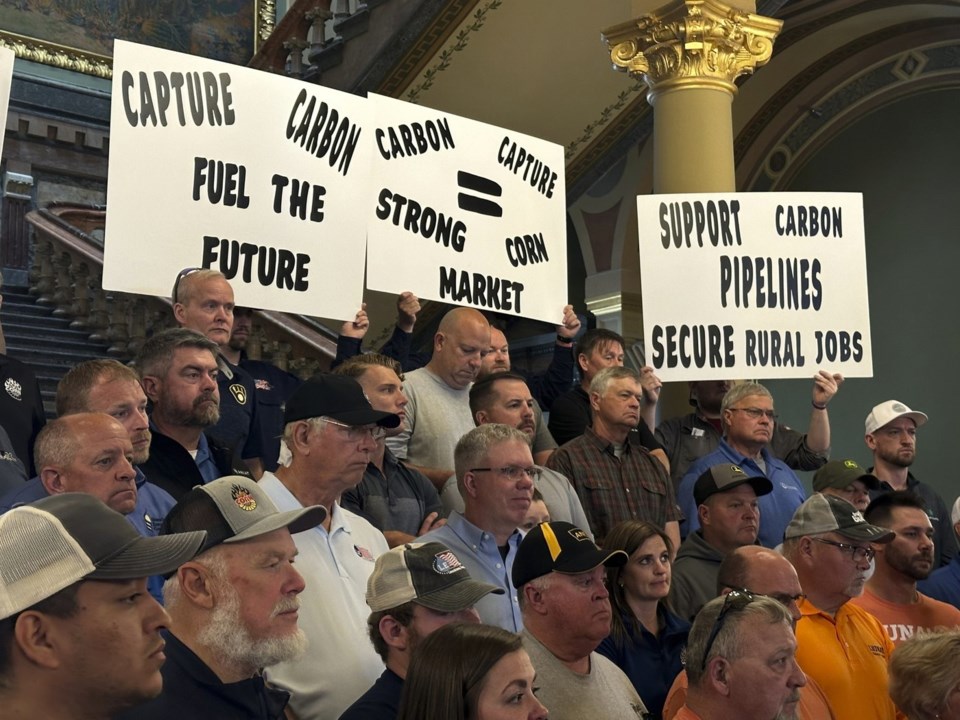DES MOINES, Iowa (AP) — The Iowa Senate advanced a bill that could further complicate a massive carbon-capture pipeline project routed across several Midwestern states after a long-winded and testy debate that exposed a clear rift among Republicans over property rights and the future of the state's agricultural dominance.
The legislation that narrowly passed late Monday would prohibit the renewal of permits for a carbon dioxide pipeline, limit the use of such a pipeline to 25 years and significantly increase the insurance coverage requirements for the pipeline company. Those provisions would likely make it less financially feasible for a company to build the pipeline.
Already passed by the House, the measure now goes to Republican Gov. Kim Reynolds' desk. A spokesperson for the governor said Tuesday that the governor's office is reviewing the bill.
The legislation could force adjustments to Summit Carbon Solutions’ plans for the estimated $8.9 billion, 2,500-mile (4,023-kilometer) project, which are already strained after South Dakota’s governor signed a ban on the use of eminent domain — the government seizure of private property with compensation — to acquire land for carbon dioxide pipelines.
The project received permit approvals in Iowa, Minnesota and North Dakota, but it does face various court challenges, and its application was rejected in South Dakota.
The Iowa Senate, already operating in overtime as legislative session drags on, came to a halt after a dozen Republican state senators insisted that their leaders bring a pipeline bill to the floor.
In response, Summit spokesperson Sabrina Zenor this month outlined the company's investment to date, saying that the company remained committed to building the project and to Iowa.
“Summit Carbon Solutions has invested four years and nearly $175 million on voluntary agreements in Iowa, signing agreements with more than 1,300 landowners and securing 75% of the Phase One route,” Zenor said in a May 1 statement.
Zenor declined to comment Tuesday.
Dozens of Summit employees and leaders and members of the Iowa Corn Growers Association, the Iowa Renewable Fuels Association and labor unions made a big showing as debate in the state Senate seemed inevitable. They told lawmakers that the project is essential for the future of Iowa’s ethanol industry, for farmers and for construction jobs.
The pipeline would carry carbon emissions from ethanol plants in Iowa, Minnesota, Nebraska, North Dakota and South Dakota to be stored underground permanently in North Dakota. By lowering carbon emissions from the plants, the pipeline would lower their carbon intensity scores and make them more competitive in the renewable fuels market.
The project would also allow ethanol producers and Summit to tap into federal tax credits.
A majority of the Iowa Senate “turned their back on Iowa agriculture tonight,” Iowa Renewable Fuels Association Executive Director Monte Shaw said in a statement.
“For 25 years, Iowa has benefited greatly from being the most profitable place in the world to convert corn kernels into ethanol,” said Shaw, who predicts that there will be severe economic consequences if the legislation is signed into law. “Iowa is poised to be left behind.”
The pipeline's critics accuse Summit of stepping on their property rights and downplaying the safety risks of building the pipeline alongside family homes, near schools and across ranches.
Lee Enterprises and The Associated Press reviewed hundreds of cases that reveal the great legal lengths the company went to to get the project built. In South Dakota, in particular, a slew of eminent domain legal actions to obtain land sparked a groundswell of opposition that was closely watched by lawmakers in Iowa as well.
Tensions flared among the Iowa Senate's Republican supermajority, with senators openly criticizing one another and exposing the closed-door discussions that got them there. Thirteen Republican senators joined with 14 Democrats in voting in favor of the bill. Twenty-one Republicans and one Democrat voted against it.
The Republicans who opposed it stressed that they, too, respect private property rights. But they said the bill has holes that will threaten any infrastructure development in Iowa, not just carbon-capture pipelines.
They criticized the bill for drawing out the permitting process by muddying up the standards of public use, allowing anyone, anywhere to intervene, and creating unnecessary insurance disputes between the company and landowners that may be miles away.
The bill's backers said those criticisms are overblown interpretations of the legislation and distractions from the issue at hand.
Republican state Sen. Jeff Taylor, who supports the bill, said it would fundamentally ensure that companies respect the constitutional requirement for eminent domain.
“Both the Iowa Constitution and the federal Constitution specify what the requirement is for eminent domain: It’s public use,” Taylor said. “It’s not anything else. It’s not a positive business climate, it’s not helping the agribusiness in the state, it’s not the price of corn or helping the ethanol plants. It’s public use.”
Hannah Fingerhut, The Associated Press



